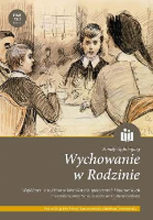Style wychowania w rodzinie a preferowane przez
młodzież cele życiowe i wartości
Education styles in a family versus life aims and values preferred
by young people
Author(s): Małgorzata DUBISSubject(s): History, Social Sciences, Education, Sociology, Social history
Published by: Zakład Historii Edukacji w Instytucie Pedagogiki Uniwersytetu Wrocławskiego
Keywords: family; education styles; values, life aims; young people
Summary/Abstract: The socio-cultural, economic and political outlook changes visible in the contemporary world provoke deep transformations in all fields of life. The social conditions of life have been also deeply changing, often causing changes in views, expectations, behaviour patterns and life standards. In such a situation a young person experiences chaos and the feeling of being lost and looses the feeling of influence on their life. In an uncertain situation and with the feeling of being lost, and with difficulties connected with the adolescent crisis, young people need support from people being close to them. The special role plays family in that case. Family is the first social environment, integrally fulfilling different needs of a child and influencing his development in all areas of his life. All socialization processes developing in a family influence the shape of opinion and attitudes, patterns, traditions and accepted values. The correct one shapes proper, real and rational ideas of future life in children. The responsible parental function and shaping the proper social system in children is based on education styles that are very important for children. These styles are influenced mainly by parents, their views, educational aims, personal experience and patterns from their home. Education styles in a family decide mainly the level of psychological and social needs fulfillment, they shape the behaviour patterns in a family and can be internalized on different levels by imitation and identification, allowing for the adoption of values and standards. The article includes the source of research concerning the declared system of values and aims in life by the respondents. The results of behaviour styles in a family research have been discussed-all meanings, the frequency of particular education styles. The author also tried to show the connection between the family functioning and values chosen by children.
Journal: Wychowanie w Rodzinie
- Issue Year: XIII/2016
- Issue No: 1
- Page Range: 193-214
- Page Count: 22
- Language: English, Polish

